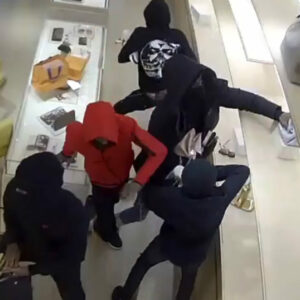This holiday season, it’s the ghost of Al Capone that’s looming over Illinois’ Christmas carolers.
A century ago, the notorious gangland boss was selling contraband booze to fund his criminal enterprises and leaving a bloody trail of death and violence in his wake.
Thanks to the internet — and the lingering effects of COVID-19 on shopping patterns — today’s gangs sell everything from black-market cigarettes to shoplifted goods to fentanyl-laced “faux-maceuticals,” often to unsuspecting customers.
And like Capone, the profits from the sale of illegal honey to counterfeit Blackhawks merchandise are used “to fund the sales and movement of drugs, weapons, and even human trafficking, making life harder and more dangerous for Illinois residents,” according to the group United to Safeguard America From Illegal Trade (USA-IT).
In 2021, retail thefts in Illinois totaled $2 billion. Many of those stolen goods wind up on the “dark web,” sold to shoppers looking for a way to beat inflation and save a few bucks.
“I think people have fallen into the habit of thinking of shoplifting as a victimless crime and it is not,” said Rob Karr, president and CEO of the Illinois Retail Merchants Association, a USA-IT member. “It’s a high-profit center for these crimes.”
And while Karr points to the now-infamous smash-and-grab robberies on the Miracle Mile, the problem of Organized Retail Crime, which supplies the online scammers, stretches across the Land of Lincoln.
“Does that same person in Chicago, or that same car that was stolen, do they show up down the road in Peoria, in Bloomington, in Normal? If so, there is a connection,” Karr said. And that connection is almost certainly a gang or organized crime organization.
During a recent USA-IT summit in Washington, members of law enforcement repeatedly expressed concerns that citizens are shrugging off shoplifting and online scams as petty crimes.
Jonathan Willis of Homeland Security Investigations, the chief investigating arm of the Department of Homeland Security, told of a bust in November that recovered $200,000 in stolen retail goods, including baby formula. But Homeland Security Investigations also seized 28 guns and 25,000 rounds of ammunition.
“It’s an example that shows people who steal things and fence things are likely involved in more deadly crimes as well,” Willis said.
Some of the same networks trafficking in stolen goods and illicit drugs have moved to an even more sinister crime: Trafficking in humans. Illinois ranks 10th in U.S. human trafficking cases, USA-IT reports.
And while it’s a more mundane problem, the counterfeit and retail theft crimes are also robbing Illinois communities of better roads, safer schools and more police officers. That’s because illicit sales cost Illinois more than $225 million in state and local taxes.
“Somebody says, ‘Well, we should not worry that much about shoplifting.’ No, we should,” Karr said. “Because it’s your friend and neighbor who is working at the store or managing the store, but it’s also your roads that are not getting repaired, your schools that are not getting funded properly, and when police cannot afford an extra officer on the day shift or the night shift, it impacts them.”
And then there’s the personal safety aspect of the counterfeit goods problem. While fake prescription drugs and personal protective equipment may make the headlines, consumer goods like toys and clothes also pose their own dangers. The American Apparel & Footwear Association recently tested 47 products sold online by unauthorized vendors, including clothing, footwear and other accessories. More than a third failed to comply with U.S. product safety standards, including high levels of toxins like lead and arsenic.
“Counterfeiters do not necessarily care to make the safest products possible,” said Jennifer Hanks, AAFA chief advocate and spokesperson. “It’s about the money and the money laundering, the things they’re doing with those funds.”
State lawmakers have recently begun to take the challenge more seriously. Last May, Illinois passed legislation that defines organized retail crime into law and toughens penalties for ringleaders. The law goes into effect January 1. A ringleader is anyone who recruits individuals, manages money, or directs people to steal and resell merchandise valued at $300 or more.
But retailers say the most effective weapon in the fight against illicit sales and the serious crime it supports is an informed consumer.
Santa may be able to do magic, but the internet isn’t the North Pole. If the deal seems too good to be true, it probably is.

